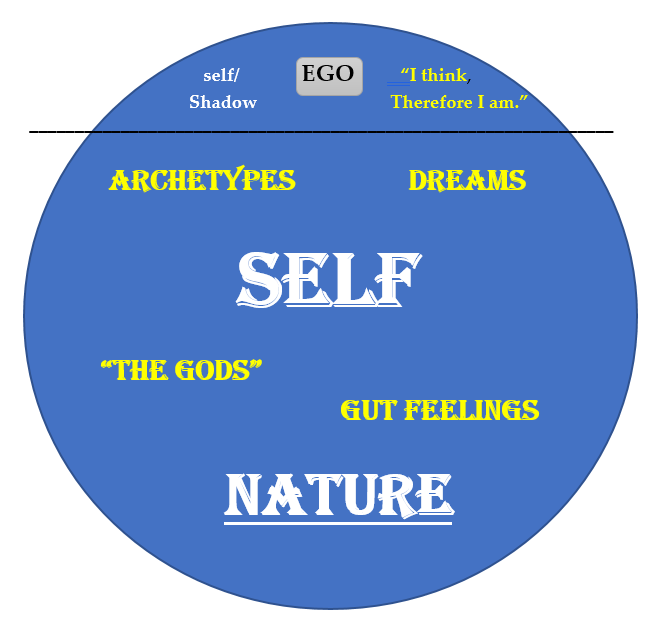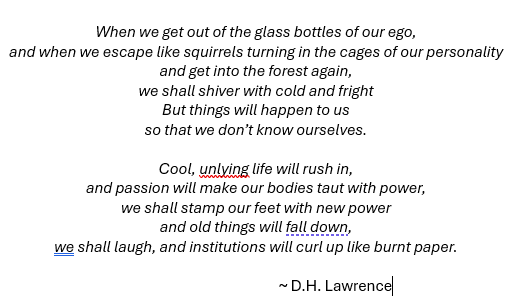Our current paradigm of knowledge, rooted in reason, logic, and the scientific method, originates from the Greek tradition. “Logos” is the Greek word for “word.”
Logic, identified with reason, is a process of expression, a means of bringing forth and articulating concepts that are fundamental and beyond the direct reach of the words used to elucidate those deeper thoughts. Thus, in the Bible we read, “In the beginning was the Word… and the Word was God.”
Psyche is the Greek word for soul, and psyche + logos – aka psych-ology — is the scientific study of the human mind or soul (psyche). Similarly, mythology is the systematic inquiry into myths; cosmology the logical analysis of the cosmos; anthropology the disciplined examination of humans; pathology, the orderly investigation of suffering, etc.
A major problem exists within this paradigm of knowledge, as shown in the picture below. The large blue circle represents the totality of who we are, while the horizontal line separates what is potentially conscious (above) from the unconscious (below). As you can see, the portion above the line represents at most 10% of who we are, assuming we become fully conscious which, as we know, is more the exception than the rule. In fact, the small, grey box labeled “EGO” serves to highlight the fact that an enormous amount of our available attention and energy is concentrated on that small fragment of what we might be conscious of.

For simplicity’s sake. over the years I’ve come to refer to what’s above the line — the domain of our rational, logical, languaged mind — as “The Known”, and everything below the line as “The Unknown.” And simply put, the problem is this: a) the totality of who we are includes The Known and The Unknown, and The Unknown is vastly larger than The Known… b) we can experience and develop a relationship to The Unknown… but c) by itself, that rational logical thinking mind, aka the Logos is incapable of, and a barrier to, engaging with that larger part of ourselves.
In most instances, psychology and psychotherapy keep us mired in the known… Most are talk-oriented and keep us stuck in our heads – the Known — and inadequate for guiding us into the fullness of who we can be. In seeking paths that produce growth and major change, some of the best examples come from rites of passage and initiation as practiced by many indigenous people from the past.
These rites included several different elements. There was a severance, a removal from the village… from the past, the comforting and familiar, but old ways of being in the world. The initiates were introduced into a new community, the elders, perhaps dressed as gods, bearing a new set of teachings about this larger life, including its roles and responsibilities, as well as a challenge, ordeal, or experience that demanded engagement with the larger world — the world of nature… primal forces, ancestors, or gods — and required the initiate to find his/her path… power… mission… or medicine.
Since the Unknown is so vast compared to the known, all religions, philosophies, or forms of inquiry focused on the Known will be limited at best, and foolish or dangerous at worst. We are taught and can try to be reasonable, but in fundamental ways we are not.

Primal cultures referred to the living presence of this “Unknown” as the Great Mystery. It was the source and origin of everything – all facts, shapes, forms, and expressions of existence – the wellspring out of which emerged all which could be experienced and known. The Great Mystery was a focus of reverence, the matrix and mother of our being-ness, the background and context within which we live, know, and perceive.
To experience the Great Mystery is to know God, Source, our Creator. To experience does not mean to think about or understand. To experience means to be intimate with. For millennia, developing a relationship of appreciation, gratitude, and respect with this Unknown was the primary task of life. Creating, nurturing, and sustaining this relationship led to a sense of belonging, finding one’s place in the universe, and having a home. To do so resulted in deep feelings of peace, and a feeling of wonder, purpose, and connectedness with all parts of creation.
The values of psychology are ego-oriented. They emphasize self-knowledge, increasing self-esteem, and getting what we want. Yet, these notions of self are a large part of our current problem. The “I” is not the center of the world and when this self is removed from center, the world around it expands correspondingly, and feelings of wonder, magic, and magnificence develop and flower.

The avenues to move beyond the self are many and varied. Some involve expressions of surrender, praise, gratitude, or prayer. Others use the physical, sensory world (ordeals, fasting, breath, yoga, sound); evoke the emotions through fear, compassion, or devotion; address the mind, (usually in the form of quieting it); or nurture the imaginative/visionary realm through dreams, art, poetry, shamanic trance, or the use of plant allies.
These practices can range from austere to elaborate, easy to difficult, from vision quests and initiatory rites to the simple expression of gratitude. But at their core they share one thing in common: a shrinking or removal of attention and energy from the self in its ordinary and consensual reality, and/or a corresponding emphasis on all that lies beyond … that changing, fluid, magical, and mysterious “world” of The Unknown, and the profusion of possibilities to perceive and engage with it.
The vast landscape of the Unknown may include domains and territories labeled emotional, sensual, irrational, or spiritual. Entering this world might include forays into instinct, wildness, sensuality, the shadow… encounters with power animals, spirit guides, shamanic realities… explorations in dream synchronicities, conversations with ancestors, or interspecies communication… and much more. These forms of engagement all lie outside the current consensual circle of the Known, and any (or all) could be labeled frightening, flaky, irrelevant, or simply unreal.



Hi Sparrow, thanks for some more insightful thoughts. I couldn’t agree with you more regarding your perspective on psychology. While very beneficial at times, there comes a point when, as you so aptly state, it “keeps us stuck in our heads.” I spent far too much time mired in introspective thought and was not fully unaware of the importance of removing the self from center. The time I spent alone in nature and with our group was a life altering experience that helped me embrace the unknown and see the bigger picture. Thanks again!
Correction fully “aware”!
Hi Russell… I’ve certainly been there as well… spent many an hour in a therapist’s office, some with people I really loved and were helpful and others which I could have skipped and not missed anything really. But I agree, there comes a point where we’ve been loved or healed enough to move on beyond our self-focus and into a greater and larger world where we just aren’t the center and that self-focus only gets in the way.
Thanks for sharing your thoughts, and for sharing yourself so fully way back when we were sitting next to the Mimbres and then the Gila River. Many blessings….